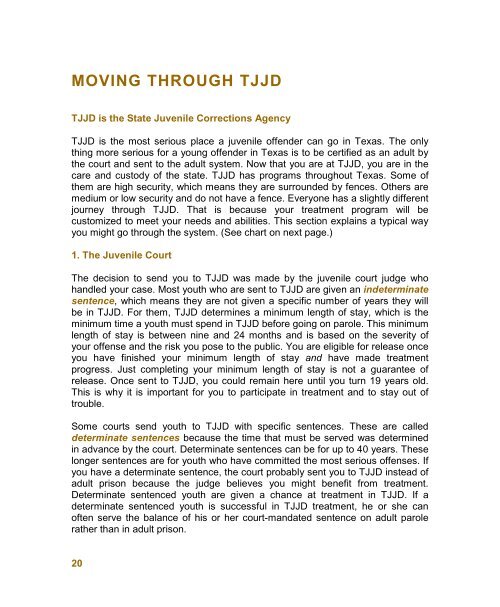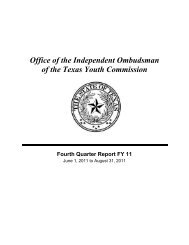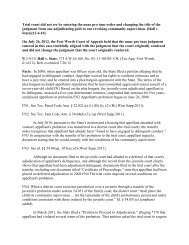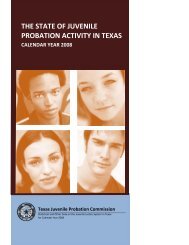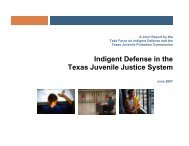(TJJD) Youth Handbook - Texas Juvenile Justice Department
(TJJD) Youth Handbook - Texas Juvenile Justice Department
(TJJD) Youth Handbook - Texas Juvenile Justice Department
Create successful ePaper yourself
Turn your PDF publications into a flip-book with our unique Google optimized e-Paper software.
MOVING THROUGH <strong>TJJD</strong><strong>TJJD</strong> is the State <strong>Juvenile</strong> Corrections Agency<strong>TJJD</strong> is the most serious place a juvenile offender can go in <strong>Texas</strong>. The onlything more serious for a young offender in <strong>Texas</strong> is to be certified as an adult bythe court and sent to the adult system. Now that you are at <strong>TJJD</strong>, you are in thecare and custody of the state. <strong>TJJD</strong> has programs throughout <strong>Texas</strong>. Some ofthem are high security, which means they are surrounded by fences. Others aremedium or low security and do not have a fence. Everyone has a slightly differentjourney through <strong>TJJD</strong>. That is because your treatment program will becustomized to meet your needs and abilities. This section explains a typical wayyou might go through the system. (See chart on next page.)1. The <strong>Juvenile</strong> CourtThe decision to send you to <strong>TJJD</strong> was made by the juvenile court judge whohandled your case. Most youth who are sent to <strong>TJJD</strong> are given an indeterminatesentence, which means they are not given a specific number of years they willbe in <strong>TJJD</strong>. For them, <strong>TJJD</strong> determines a minimum length of stay, which is theminimum time a youth must spend in <strong>TJJD</strong> before going on parole. This minimumlength of stay is between nine and 24 months and is based on the severity ofyour offense and the risk you pose to the public. You are eligible for release onceyou have finished your minimum length of stay and have made treatmentprogress. Just completing your minimum length of stay is not a guarantee ofrelease. Once sent to <strong>TJJD</strong>, you could remain here until you turn 19 years old.This is why it is important for you to participate in treatment and to stay out oftrouble.Some courts send youth to <strong>TJJD</strong> with specific sentences. These are calleddeterminate sentences because the time that must be served was determinedin advance by the court. Determinate sentences can be for up to 40 years. Theselonger sentences are for youth who have committed the most serious offenses. Ifyou have a determinate sentence, the court probably sent you to <strong>TJJD</strong> instead ofadult prison because the judge believes you might benefit from treatment.Determinate sentenced youth are given a chance at treatment in <strong>TJJD</strong>. If adeterminate sentenced youth is successful in <strong>TJJD</strong> treatment, he or she canoften serve the balance of his or her court-mandated sentence on adult parolerather than in adult prison.20


